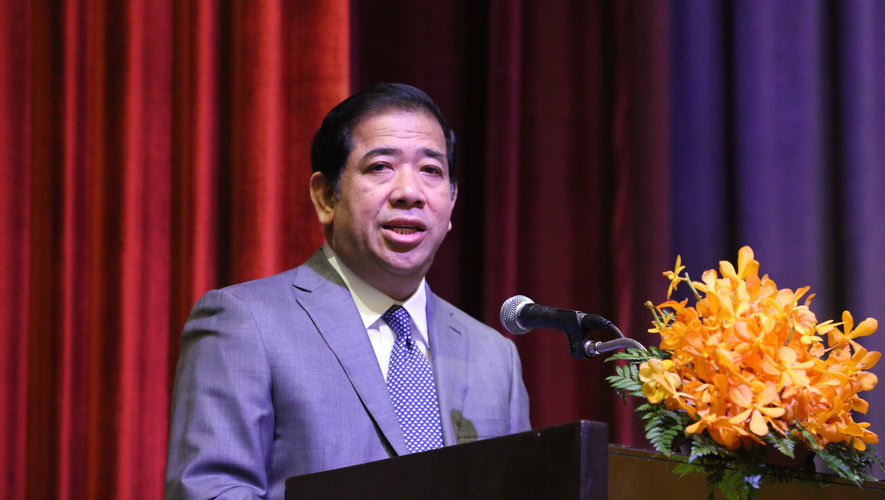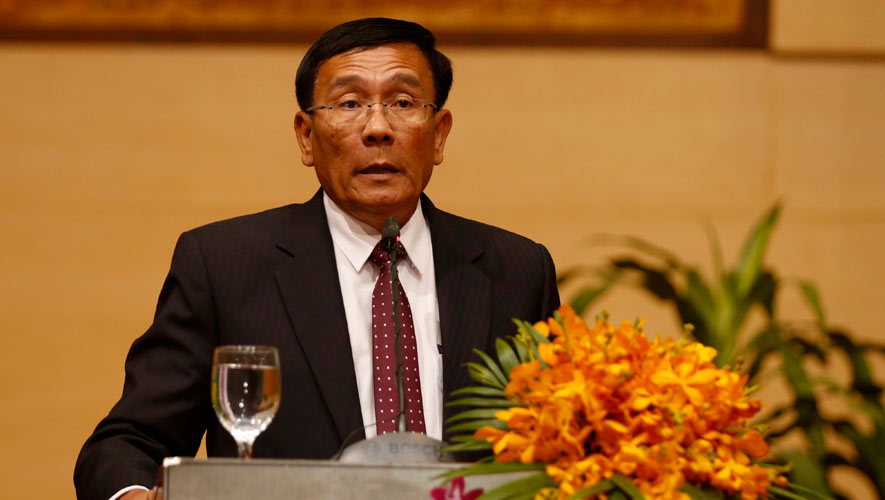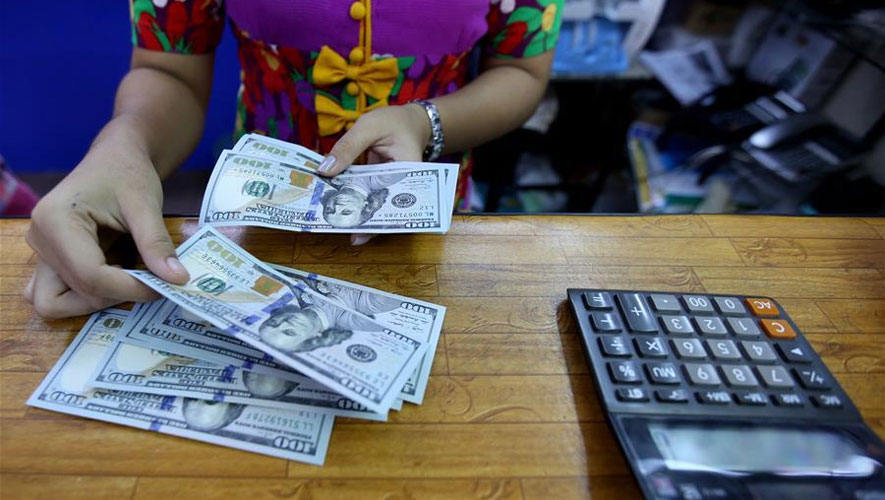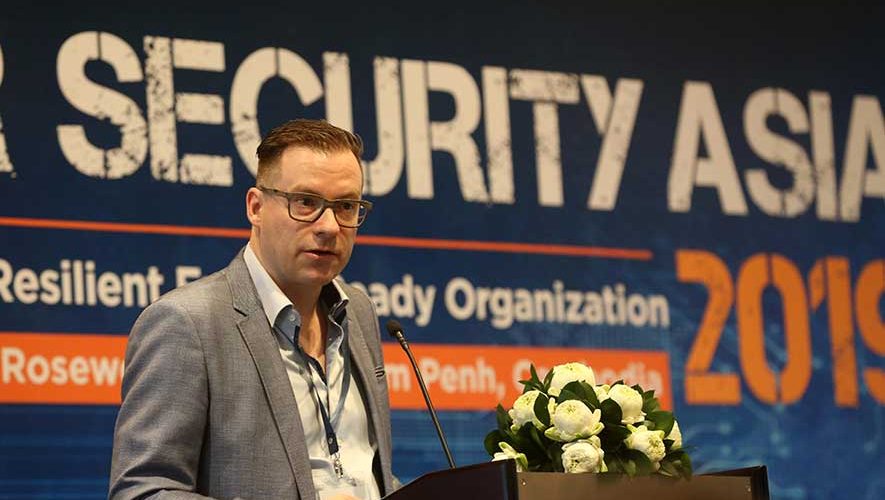It’s early March and many of the 286 rooms in the luxury five-star Angkor Howard Hotel in Siem Reap are empty. Even for low season, the occupancy rate of just 20 rooms is worry-inducing for the owners and staff.
For the latest Cambodian Business news, visit Khmer Times Business
Usually at this time of year, the hotel would be hosting tourists from all around the world, in particular those from China, Japan and Korea, here to visit the world-famous Angkor Watt temple complex. But this year, visitors are staying away, fearful of the COVID-19 outbreak and keen to save their money in the face of the economic downturn the virus has triggered.
Not even a reduction of the room fee, which includes breakfast, from $50 to $38 per night is tempting potential trade.
Nol Sreymeas, the hotel’s reservation officer, says that it’s not just foreign tourists who are staying away and less than 100-strong staff are feeling the effects. “Local tourist numbers have dropped off and our boss recently asked the employees to take an unpaid break, some for a week and others for 15 days, while the hotel was closed for renovation and maintenance.”

Director General of General Department of Taxation.
It’s a similar story in many other of Siem Reap province’s other 227 hotels and 248 guesthouses. Angkor Archeological Park, the site of Angkor Watt, received 341,494 foreign tourists in the first two months of 2020, down 37 percent over the same period last year. And while the state-owned attraction made a gross revenue of $16.2 million from ticket sales during the January-February period this year, it represents a 35 percent drop on the same period last year, according to a statement from Angkor Enterprise, who run operations there.
In the wider picture, the State Secretariat of Civil Aviation has recorded a sharp decline in the number of foreign visitors coming into the Kingdom in the midst of COVID-19 fears.
“The number of [incoming] tourists have declined by some 52 percent compared with the same period last year,” says Sin Chan Sereyvutha, spokesman for the secretariat. “Almost 38 airline companies have reduced flights because they had no passengers. Bangkok Airways, for example, had six flights per day but now they only operate four; Silk Air used to fly 10
times a week, now they only have
five flights.”
While the full implications for Cambodia’s aviation industry are yet to be assessed, according to a preliminary report by the International Civil Aviation Organisation, COVID-19 fear is expected to cost neighbouring Asean country Thailand $1.2 billion and Japan $1.25 billion.
Norinda Khek, communication and PR director of Cambodia has also witnessed first-hand the empty arrival halls at the country’s three major airports. “In February, arrivals were down by 59.9 percent at Sihanoukville and by 59.5 percent at Siem Reap, while arrivals into the capital of Phnom Penh dropped by 37.8 percent.”

secretary of state. KT/Siv Channa
But Khek says that rather than becoming despondent in the face of the adverse situation, ‘‘tourism and aviation stakeholders, both from the private and public sectors, must work together and come up with initiatives on a global scale”.
Back on the ground in Siem Reap, despite the continuing uncertain outlook for April and May – with many of Angkor Howard Hotel’s reservations already cancelled – Nol remains philisophical.
“We know that this is a worldwide problem, so we [the staff] are happy to accept the request by the boss to take unpaid leave,” she says.
Despite Nol’s upbeat attitude, the situation is far from ideal. But at least the province’s hospitality industry has some shelter from the financial storm, thanks to Prime Minister Hun Sen’s directive that all registered hotels and guesthouses in Siem Reap province are tax-exempt between February and May this year. The move was precipitated by a dramatic 60 percent decline in foreign visitors coming to the Kingdom in February, when compared to 2019. However, hospitality businesses within the province are still obliged to declare their tax and VAT during the four-month period, using the government’s online system.
While Siem Reap province is arguably one of Cambodia’s main tourist magnets, according to a recent report from the Ministry of Tourism, Cambodia has a total of 1,044 hotels and 2,643 guesthouses. This has lead the Cambodia Hotel Association (CHA) to call for the government to consider extending the tax relief to the entire country to help buoy up the whole of the tourism sector.

Speaking to Capital Cambodia, Clais Chenda, president of the Cambodia Hotel Association and owner of the Terres Rouges Lodge in Ratanakiri and Rajabori Villas on Koh Trong Island in Katie, said that a blanket tax exemption for Cambodia’s hospitality industry would encourage hotel and guesthouse operators to continue trading and stop them from taking out bank loans simply to pay their taxes.
“Hotel and guesthouse operators are losing customers and profit, not just in Siem Reap, but nationwide. This includes Sihanoukville, Phnom Penh, and other provinces,” she says. “Also, it would be even better if the government would stretch the tax break until October or November, when the high season begins. This will give the hospitality industry a greater chance to recover, strengthen our services and expand the market to generate enough revenue to pay tax to the government,” she adds.
Indeed, Clais notes that the Northeastern province of Ratanakiri – the location of her own hostelry – is particularly quiet, saying, “We cannot find the foreigner there”. But in her position as president of the CHA, she is encouraging hotel and guesthouse owners to utilise the time to keep marketing their business – and Cambodia as a whole – to potential visitors from around the world. She also suggests another practical approach is to take advantage of the low occupancy rates to renovate or do essential maintenance, in a similar vein to the Angkor Howard Hotel.
There is a glimmer of hope on the horizon, however, with Permanent Secretary of State Tith Chantha hinting that there may be plans to offer the much-needed tax break to the country’s remaining 23 states. In the meantime, he says that Ministry of Tourism is also planning other ways to help keep the sector afloat during this difficult time.
“We are going to organise training programs for the currently unemployed workers in tourism (hotel workers, guesthouses and travel agents), plus offer new knowledge training (Re-skilling) or increased education (Upskilling),” he reveals. “We are also looking into the provision of appropriate salaries. It is important for visiting tourists to know that their guide is being properly paid.”
To further aid the ailing industry – and entice visitors back to the country – he adds that the government are looking to optimise the efficiency of joint travel by land, water and air, especially with neighboring countries (Bangkok-Siem Reap and Ho Chi Minh-Siem Reap), especially by bus or personal car, to make the process easier and smoother.
Kong Vibol, the director-general of the General Department of Taxation, summing up the sentiments of the entire hospitality sector, says he’s praying the industry’s fortunes will turn around very soon. “We hope that in the coming months, management of the virus will reduce the outbreak and all of our businesses can return to normal,” he says.
Many in the tourism industry will be saying ‘Amen’
to that.




